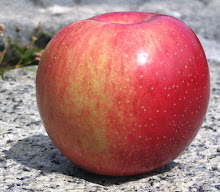Apples are bought by the likes of you and me (with, one hopes, our usual flawless taste).
We might be lured by one of those sleek modern names like Zestar or Honeycrisp, crafted to suggest sweetness and a snazzy, jazzy zestfulness.
Apple trees, on the other hand, are bought by growers, and sometimes the marketing effort is aimed at them.
Enterprise
is not targeted at Star Trek fans. Rather it proclaims that variety's bona
fides as a good investment, a sturdy, high-yielding low-maintenance crop.
(There's another story about the letters "PRI" in the name, which can wait
for another time.)
Similarly, the freedom in
Redfree
is all about freedom from disease, sprays, and labor.
Many of these grower-centric marketing efforts resort to the rhetoric of the American revolution: Redfree, Freedom, Jonafree, Liberty (my favorite of these so far), Macfree. Their names all extol the same qualities, no-drama crops that produce reliably and resist disease without tons of chemicals. Expensive chemicals, laborious to apply.
This in turn should give you an idea of some of the things on the mind of your local apple grower!


So now you've got me wondering, Adam. If the trees are named as above, are you saying the apples are not necessarily bearing the name of the tree? I'd have thought they would be one in the same. Nina, not really anonymous.
ReplyDeleteNina, I just meant that we buy apples, but farmers buy trees.
ReplyDeleteSame names for both: Liberty, McIntosh, Gravenstein, each describes both a tree and its fruit.
We buy the fruit because (apparently) they're sweet and crisp and juicy; farmers buy trees because we like the apples and, sometimes, because they're easy to care for.
Congruent, but different, criteria. Same names.
If you buy a painting, probably you don't worry much about the cost or brand of paint and canvas and gesso. But the artist does.
Adam, I wasn't sure because some of the tree names you gave are not familiar to me as apples in the store. I understand now.
ReplyDeleteAs for buying a painting and thinking of the paint, canvas, gesso... probably not the best analogy for the likes of me. I do give thought to those things if and when purchasing a painting or a print. I'd want to know was it made with high quality paints that are colorfast? Is it printed on archival paper? What sort of paper is it? Oh, there are many things like that I would give some thought to. But that's because I'm closer to being the farmer than the consumer of apples, in this comparison.
But I do get your point and thank you for the clarification.
not so anonymously, Nina
Not-so-anonymous Nina, we all have relationships to food, and to other things that we buy, that are more complex than my imperfect analogy allows.
ReplyDeleteIf you don't like being as anonymous as you are, I believe Blogger supports multiple ways to incorporate your identity into a comment here, including LiveJournal and OpenID, and a catch-all method called "Name/URL" where you can be "Nina" (no need to specify a url, I think).
I'm happy to hear from you whatever you do (or don't do) about that.
Interesting conversation. In think many of the apples we find in the supermarket, or at the farm stand are there because they have proven themselves to both the consumer and the grower.
ReplyDeleteI remember reading somewhere, that at the Genevea Experimental Station, where they have bred many well-known apple varieties over the years, the focus of the breeding has largely changed throughout the last century from simply breeding apples that taste good to focusing more on apples that benefit the commercial producer as well. A product perhaps of the overly competitive global apple market.
An economist would probably say that all of the industrial apples--the varieties you can typically find in supermarkets year-round--meet the needs of both consumer and grower, as Chris says. Or else, they wouldn't be gown and sold.
ReplyDeleteNonetheless I do not see these super-hardy varieties, Liberty and Enterprise and company, anyplace other than farm-stands and farmers markets, probably because they do not cater to the modern taste for sugar.
These varieties nonetheless do well on organic farms, because they naturally resist pests and diseases that can wipe out or disfigure a crop.
Perhaps they will catch on yet.